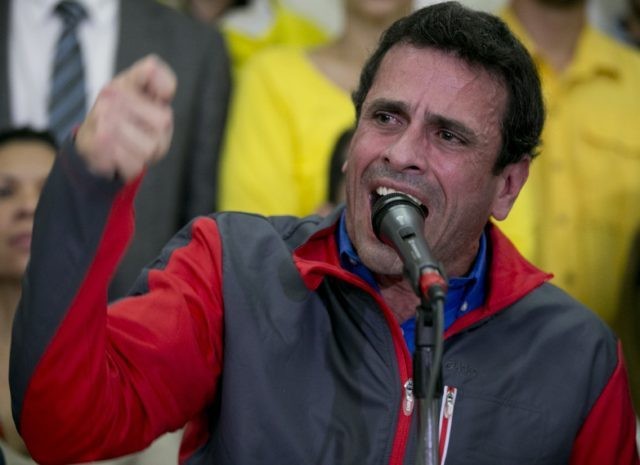Venezuela’s opposition coalition said on Tuesday it would not participate in talks with the country’s ruling socialist regime, amid suspicion that they are an attempt to detract from global criticism that the country has turned into a dictatorship.
“Negotiation is not to go and waste time, to look at someone’s face, but rather so that Venezuelans can have immediate solutions,” opposition leader Henrique Capriles told reporters.
“We cannot have a repeat of last year’s failure,” he said, referring to Vatican-organized talks in 2016 that collapsed after the opposition claimed the government was using them as a stalling tactic.
Some of the Venezuelan opposition’s red lines for any negotiation with the government include setting a date for the next presidential election before the end of 2018, with measures taken to ensure it will be free and fair. They also include the release of hundreds of opposition activists jailed by the regime, as well as the return of lawmaking power to the country’s democratically elected Congress.
The eagerness of the ruling socialist party to promote dialogue with opposition parties has been met with widespread skepticism, with critics suggesting it is simply a ploy to prevent additional international sanctions against the regime.
In recent months, the U.S. Treasury has pummelled Venezuela with sanctions as a response to dictator Nicolás Maduro’s creation of a “national constituent assembly,” a fraudulent lawmaking body filled exclusively with Maduro cronies that has effectively rendered the country a dictatorship.
Previous sanctions imposed by the White House include a ban on Americans from dealing in Venezuelan government debt or that of its state-run oil company, as well as personal sanctions placed against Maduro and other government officials. As a result, Maduro has accused the United States of waging an “economic war” against Venezuela.
This month, the Venezuelan government ran an advertisement in the New York Times accusing the White House of “imposing severe and unfair sanctions” that will affect their “economy and means to obtain resources for food, healthcare, and production.”
Meanwhile, Spain has also been engaged in efforts to lobby the European Union to adopt restrictive measures against Venezuela, although have not outlined what they will entail, with the Venezuelan foreign ministry describing Spanish Prime Minister Mariano Rajoy as “representing the worst of our colonial past.”
Venezuela’s political and humanitarian crisis is now at a breaking point, with millions of people living in abject poverty as a result of skyrocketing rates of inflation that have left the country with chronic shortages of food, medicine, electricity, and sanitary products. Amid skyrocketing inflation, and despite three minimum wage hikes over the course of 2017, the country’s monthly minimum wage of 97,500 bolivars is now equivalent to around $3.88 a month.
Follow Ben Kew on Facebook, Twitter at @ben_kew, or email him at bkew@breitbart.com

COMMENTS
Please let us know if you're having issues with commenting.